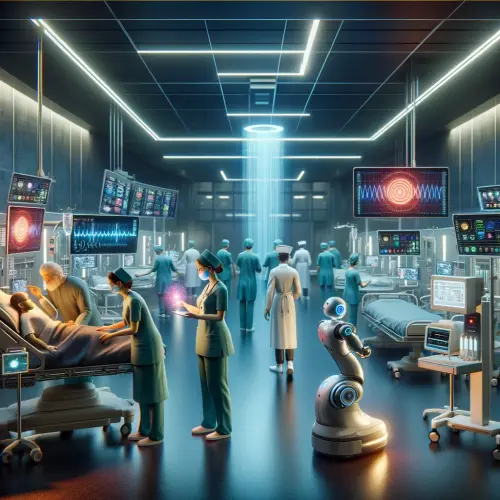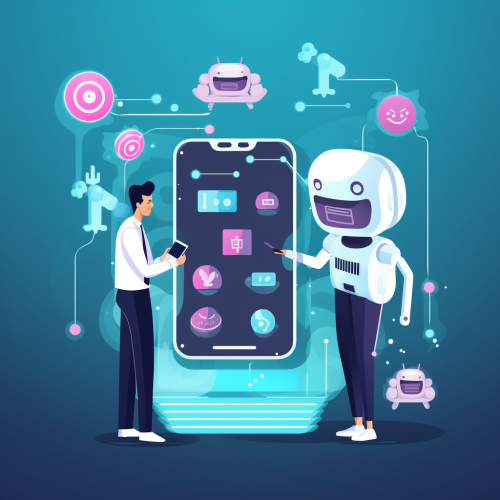A Comprehensive Review of Generative AI in Healthcare: Its Impact
Introduction
Artificial Intelligence (AI) technology, characterized by its ability to mimic human intelligence and perform tasks such as learning, problem-solving, and decision-making, has become a transformative force across numerous sectors. Its integration into industries ranging from finance to education marks a significant leap toward operational efficiency and innovation. Particularly in healthcare, AI’s potential to revolutionize patient care, diagnosis, and treatment processes heralds the use of AI in the new era of medical technology. From predictive analytics that forecast outbreaks to algorithms that provide personalized treatment recommendations, the implications of AI in healthcare are profound and far-reaching.
This article aims to critically evaluate the impact of AI technology within the broader health care sector, shedding light on the multifaceted role it plays in transforming medical practices and patient outcomes. By examining both sides of the coin, we delve into the myriad ways through which AI contributes to advancements in healthcare, enhancing efficiency, accuracy, and patient care. Concurrently, we explore the challenges and ethical considerations that accompany the adoption of AI, including data privacy concerns, potential biases in AI algorithms, and the implications of technological dependency. Through this balanced exploration, our objective is to provide a comprehensive overview of AI’s potential benefits and pitfalls within the healthcare landscape, offering insights into the future of AI-driven medical care and the measures needed to ensure its responsible and effective implementation.
Section 1: The Rise of AI in Healthcare
The healthcare sector has been at the forefront of embracing Artificial Intelligence (AI), leveraging its capabilities to enhance various aspects of patient care and administrative efficiency. Generative AI models can streamline and enhance clinical documentation processes by automating the summarization of patient data collected in electronic health records (EHRs), thereby reducing the administrative burden on healthcare providers while improving communication and accuracy in patient care. This section provides an overview of AI’s applications in healthcare, traces its historical adoption, and discusses current trends and future projections. AI tools are increasingly bridging healthcare gaps in emerging markets by diagnosing chronic illnesses, increasing staff efficiency, improving physician-patient communication, transcribing medical documents, and facilitating patient access to available physicians and appointment scheduling. However, concerns about data privacy and the need for regulation to address potential racial and gender biases in AI algorithms, ensure the privacy of health data, and promote the responsible implementation of generative AI in healthcare are paramount.
Overview of AI Applications in Healthcare
Diagnostics and Medical Imaging
AI algorithms have shown remarkable accuracy in diagnosing diseases from image data, such as X-rays, MRIs, and CT scans. By analyzing patterns in the data, AI can identify conditions such as cancer, fractures, and neurological disorders faster and often more accurately than human practitioners.
Treatment Planning
AI supports personalized medicine through better health outcomes by helping in the creation of tailored treatment plans for patients based on their unique health data. It can analyze vast amounts of medical literature and patient records to suggest the most effective treatments for specific conditions.
Patient Monitoring and Management
Wearable devices and mobile health apps equipped with AI monitor patient vitals and symptoms in real-time, allowing for continuous care outside traditional healthcare settings. AI systems can alert healthcare providers to potential health issues before they become critical, facilitating timely interventions.
Historical Perspective on the Adoption of AI Technologies in Healthcare Settings
The integration of AI in healthcare began in the late 20th century, albeit at a modest pace. Early applications focused on rule-based expert systems to assist with diagnosis and treatment decisions. Over the years, the advent of more sophisticated AI models and the explosion of available health data have accelerated AI's adoption. Significant milestones include the development of AI for diagnostic medical imaging alone, the use of machine learning in genomic sequencing, and the creation of AI-driven personal health assistants.
Current Trends and Future Projections of AI Use in the Healthcare Industry
Personalized Medicine
One of the most promising trends is the push toward personalized medicine, where AI algorithms use genetic information, lifestyle data, and environmental factors to tailor treatments to individual patients. This approach aims to increase the efficacy of treatments and reduce adverse reactions.
Predictive Analytics
AI is increasingly used for predictive analytics in healthcare, forecasting disease outbreaks, patient admissions, and even potential medical complications. This capability can help healthcare systems allocate resources more effectively and improve patient outcomes.
Automation of Routine Tasks
AI-driven automation of administrative and routine clinical tasks is another growing trend, helping to reduce the burden on healthcare professionals and allowing them to focus more on patient care.
Natural language processing (NLP) facilitates the automation of routine text-related tasks in healthcare, such as transcribing medical notes, processing patient records, and generating reports.
Ethical AI and Regulation
As AI’s role in healthcare expands, there is a growing focus on developing ethical guidelines and regulatory frameworks to ensure patient safety and data privacy. Synthetic data, generated using techniques like generative AI models such as GANs, plays a crucial role in addressing data privacy concerns by creating realistic and anonymized datasets. Future projections indicate that these considerations will become central to the deployment of AI in healthcare.
Expansion into Emerging Markets
AI is set to play a crucial role in bridging the healthcare gap in emerging markets, offering affordable and accessible medical diagnostics medical diagnosis and treatment options to underserved populations.
In conclusion, the rise of AI in healthcare is a testament to the technology's potential to revolutionize the way medical care is delivered and managed. From its early applications to the cutting-edge developments of today, AI continues to push the boundaries of what is possible in healthcare, promising to make it more personalized, efficient, and accessible.
Section 2: Development and Research in Generative AI
Development Status of Intelligent Medical Equipment
The development of intelligent medical equipment has achieved significant milestones in recent years. The incorporation of artificial intelligence (AI) has enhanced processing capabilities and accuracy, thereby improving diagnostic efficiency. Intelligent medical devices can analyze vast amounts of medical images and data, providing early disease warnings and diagnoses. These devices also enable remote medical treatment and diagnosis through wireless communication technology, increasing the convenience and efficiency of medical services. Additionally, integrating sensors and data collectors allows for real-time patient condition monitoring, improving the timeliness and accuracy of medical interventions.
However, challenges remain in the development of smart medical devices, with data security being a primary concern. These devices collect extensive medical data, often containing sensitive patient information. Ensuring the protection of this private information is crucial for the continued advancement of smart medical devices.
Research Status of Generative AI Models in Healthcare
Generative AI models have been extensively applied in intelligent medical devices, spanning areas such as medical image analysis, text analysis, and health monitoring. In medical image analysis, generative models can produce new medical images to aid in more accurate disease diagnosis. For example, deep learning models can simulate various stages and types of disease images, providing valuable diagnostic support for doctors.
For medical text analysis, generative models generate new medical texts, assisting doctors in comprehending patient conditions and treatment plans more effectively. For instance, these models can create medical summaries that enable doctors to quickly grasp patient information and treatment strategies.
In the realm of health monitoring, generative models can generate new health data to provide insights into a patient’s health status. By simulating different health conditions, these models help doctors gain a better understanding of patient health.
Overview of Common Generative AI Models
Generative AI models are pivotal machine learning algorithms within artificial intelligence, primarily designed to create novel and unseen data samples through data learning. These models hold vast potential in the realm of intelligent medical devices, significantly aiding companies in achieving more efficient and intelligent product design and manufacturing.
Variational Auto-Encoder (VAE)
Variational Auto-Encoders (VAEs) are generative models that employ an encoder-decoder architecture with a prior distribution (existing distribution). The encoder maps each input image onto a latent space. The encoded latent feature is subsequently used by the decoder to generate an image.VAEs are particularly useful for generating new data that is similar to existing data. They have been applied to image generation, music creation, and drug discovery. VAEs learn low-dimensional latent space representations of input data, aiding in applications like image generation and drug discovery.
Generative Adversarial Network (GAN)
Generative Adversarial Networks (GANs) comprise two competing networks: a generator, which forges a realistic fake image from a given latent feature, and a discriminator, which distinguishes fake images from real images. The generator attempts to deceive the discriminator via adversarial training, thereby improving image generation.
GANs are particularly useful for generating realistic images and data. They have been applied to image reconstruction, synthesis, segmentation, registration, and classification. GANs can be used to generate synthetic medical images that can be used to train machine learning models for image-based diagnosis or augment medical datasets.
GANs involve adversarial training between a generator and discriminator, producing realistic data. They have been used for image reconstruction, synthesis, segmentation, registration, and classification. GANs can be used to generate synthetic medical images that can be used to train machine learning models for image-based diagnosis or augment medical datasets.
Section 3: Benefits of AI in Healthcare Delivery

The deployment of Artificial Intelligence (AI) in healthcare has ushered in many benefits, significantly transforming patient diagnosis, treatment, operational efficiency, and overall healthcare itself. This section delves into the key advantages offered by AI, illustrating its pivotal role in enhancing healthcare delivery.
Improved Diagnostics and Treatment
AI Algorithms for Accurate and Rapid Diagnosis
AI algorithms excel in analyzing complex medical data, such as text and image data from imaging scans, with precision and speed that often surpass human capabilities. These algorithms can detect anomalies and patterns indicative of diseases, leading to early and accurate diagnoses. For example, AI has been instrumental in the early detection model evaluation of diabetic retinopathy in diabetic patients, significantly improving management outcomes by allowing for timely intervention.
Personalized Treatment Plans
AI's analytical prowess extends to evaluating a patient's unique genetic makeup, lifestyle, and health data to suggest customized treatment plans. This approach to drug development, known as precision medicine, optimizes treatment efficacy and minimizes side effects. AI systems can sift through extensive datasets to identify which treatments have been most effective for patients with similar profiles, thereby aiding clinicians in making informed treatment decisions.
Efficiency and Cost Reduction
Streamlining Administrative Tasks
AI technologies automate routine administrative tasks such as scheduling, billing, and patient record management, streamlining operations and reducing the administrative burden on healthcare professionals. This automation allows healthcare facilities to allocate their resources more efficiently, focusing on patient care rather than paperwork.
Case Studies on Operational Cost Reduction
Several hospitals and healthcare institutions have reported substantial cost savings and improved operational efficiency after integrating AI systems. For instance, a hospital utilizing AI for administrative task automation reported a 30% reduction in operational costs within the first year, alongside faster processing times for patient admissions and discharges.
Enhancing Patient Care and Monitoring by Healthcare Professionals
Continuous Patient Monitoring
Wearable devices and home monitoring equipment equipped with AI algorithms offer continuous monitoring of patient vitals and health indicators. These tools can detect early signs of deterioration in a patient's condition, enabling proactive management of chronic diseases and preventing emergencies. For example, AI-powered wearable devices for heart patients can detect abnormal heart rhythms in real-time, alerting patients and doctors to potential risks immediately.
AI in Telemedicine and Remote Care
AI plays a crucial role in telemedicine, facilitating remote consultations, diagnostics, and treatment recommendations. This has been particularly beneficial in reaching underserved or remote populations, offering them access to quality healthcare without the need for physical travel. AI-enhanced telemedicine platforms can assess symptoms, prioritize care based on urgency, and even guide patients through self-administered care steps, ensuring continuous and accessible healthcare services.
In summary, the integration of AI in healthcare brings forth significant advancements in diagnostics, treatment personalization, operational efficiency, and patient care. These benefits not only improve health outcomes but also contribute to a more sustainable and efficient healthcare system, demonstrating the transformative potential of AI in the sector.
Section 4: Challenges and Risks of AI in Healthcare
While Artificial Intelligence (AI) brings numerous benefits to healthcare, it also introduces several challenges and risks that need careful management. This section explores the key concerns related to data privacy and security, biases, and inequality, as well as the risks of dependence and dehumanization. It is crucial to address biases in AI tools to ensure equitable care across all demographics in the healthcare sector.
Data Privacy and Security Concerns
Sensitivity of Patient Data
Patient data is inherently sensitive, containing personal health information that requires stringent protection. AI systems, which often rely on large datasets for training and operation, heighten the risk of breaches of electronic health records. Unauthorized access to AI systems can lead to the exposure of confidential patient information, undermining trust in healthcare providers and potentially causing harm to patients.
Legal and Ethical Considerations
The integration of AI in healthcare raises complex legal and ethical questions about patient privacy. Compliance with regulations on healthcare data such as the General Data Protection Regulation (GDPR) in Europe and the Health Insurance Portability and Accountability Act (HIPAA) in the United States is paramount. Additionally, there's a need for ethical guidelines that address consent for the use of personal data in AI models, ensuring that patients are informed and their rights are respected.
Bias and Inequality
Biases in AI Algorithms
AI algorithms can inadvertently perpetuate or even amplify biases present in the data they are trained on. For instance, if an AI model is trained primarily on data from certain demographic groups, it may perform less accurately for others. This can lead to disparities in diagnosis, treatment recommendations, and patient outcomes, undermining the principle of equitable care in healthcare.
Digital Divide and Access to AI-enhanced Healthcare
The digital divide refers to the gap between individuals who have access to modern information and communication technology and those who do not. In the context of AI in healthcare, this divide can exacerbate existing healthcare inequalities. Populations with limited access to these digital health technologies may find themselves increasingly marginalized from the benefits of AI-enhanced healthcare, such as remote monitoring and telemedicine, further widening health disparities.
Dependence and Dehumanization
Over-reliance on AI
There is a risk that reliance on AI could lead to skill atrophy among healthcare professionals. As AI systems take over diagnostic and treatment planning tasks, clinicians might become overly dependent on these technologies, potentially leading to a degradation of their professional skills and judgment.
Loss of the Human Touch
The introduction of AI into patient care also raises concerns about the loss of the human touch. Healthcare is not just about diagnosing and treating diseases; it involves empathy, understanding, and emotional support. Over-reliance on AI could undermine these aspects of care, leading to a more impersonal healthcare experience. Moreover, ethical decision-making in complex cases requires human insight that AI cannot replicate, underscoring the importance of maintaining a balanced approach to the use of technology in healthcare.
In conclusion, while AI has the potential to transform healthcare positively, addressing these challenges and risks is crucial for its successful and ethical integration. Balancing the benefits of AI with considerations for privacy, equality, and humanity will be key to ensuring that advances in AI contribute to a healthcare system that is not only more efficient and effective but also equitable and compassionate.
Section 4: Navigating the Future of AI in Healthcare
As the healthcare sector continues to integrate Artificial Intelligence (AI) into its operations and patient care strategies, navigating the future of AI presents both exciting opportunities and significant challenges. Ensuring that AI's deployment is beneficial, ethical, and sustainable requires concerted efforts across regulatory, collaborative, and evaluative fronts.
Importance of Regulatory Frameworks
Regulatory frameworks play a crucial role in mitigating the risks associated with AI in healthcare. Such frameworks ensure that AI technologies are developed and used in ways that are safe, privacy-respecting, and non-discriminatory. Effective regulation can help prevent data breaches, protect patient confidentiality, and ensure AI systems are transparent and accountable. For instance, guidelines that require AI systems to be explainable can help healthcare providers understand AI recommendations, fostering trust and facilitating informed decision-making. Moreover, international cooperation on standards can help harmonize practices, ensuring that AI benefits are widespread and consistent across borders.
Role of Interdisciplinary Collaboration
Developing ethical and effective AI solutions necessitates interdisciplinary collaboration, bringing together healthcare professionals, AI researchers, ethicists, legal experts, and patients themselves. This collaborative approach ensures that AI technologies are not only technologically advanced but also grounded in the realities of medical practice, ethical standards, and patient needs. For example, ethicists can guide the development of AI systems that respect patient autonomy and fairness, while legal experts can help navigate the complex regulatory landscape. Including patients in the development process ensures that AI solutions are patient-centered, addressing real needs and concerns.
Continuous Evaluation and Adaptation
The rapid pace of AI development means that technologies can quickly evolve, sometimes outpacing the guidelines and frameworks initially set for them. Continuous evaluation and adaptation of AI technologies are essential to address emerging challenges, incorporate new insights, and ensure that AI systems remain aligned with healthcare goals. This includes regular assessment of AI systems for accuracy, fairness, and efficacy, as well as adapting to new healthcare needs and evidence. Ongoing research into the impacts of AI on healthcare practices, patient outcomes, and professional roles is vital to inform these adaptations. Additionally, mechanisms for feedback from healthcare practitioners and patients can provide invaluable insights for refining AI applications.
Moving Forward
Navigating the future of AI in healthcare requires a proactive, multi-faceted approach that balances innovation with caution. By establishing robust regulatory frameworks, fostering interdisciplinary collaboration, and committing to continuous evaluation and adaptation, the healthcare sector can harness the immense potential of AI to improve care delivery and patient outcomes while addressing ethical, legal, and social implications. The goal is to create an AI-enhanced healthcare environment that is not only technologically advanced but also equitable, ethical, and human-centered.
In conclusion, as the healthcare sector seeks to navigate the complex landscape of Artificial Intelligence (AI), the need for tools and platforms that can streamline this integration while addressing the accompanying challenges is paramount. IrisAgent stands out as a pivotal solution in this domain, offering AI-powered assistance that enhances healthcare operations, diagnostics, and patient engagement. By leveraging IrisAgent, healthcare providers can ensure the ethical deployment of AI, maintain high standards of patient care, and adapt to the evolving technological and regulatory environment. IrisAgent's capabilities in automating routine tasks, facilitating accurate diagnostics during patient visits, and providing actionable insights not only optimize healthcare delivery but also safeguard against the risks of bias, data breaches, and the depersonalization of care. Book a demo today to learn more.




